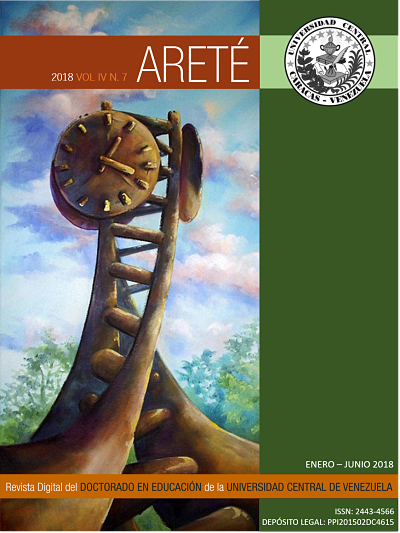Pertinencia social de la investigación educativa: concepto e indicadores
Keywords:
Pertinencia social, investigación educativa, dimensiones, indicadoresAbstract
La importancia de evaluar la pertinencia social de una investigación radica en la necesidad promover y dirigir los estudios hacia problemas prioritarios para satisfacer necesidades y generar beneficios a grupos mayoritarios. Es por eso que el presente artículo se propuso precisar el concepto de pertinencia social de la investigación educativa y definir algunos indicadores que permitan determinar cuándo y en qué medida es pertinente, desde el punto de vista social, una investigación en el ámbito educativo. Para cumplir con tales objetivos, se realizó una exhaustiva revisión documental que permitió seleccionar los trabajos que fueron objeto de análisis, específicamente en cuanto a los criterios que definen a una investigación como socialmente pertinente. Como producto final se propone un sistema de indicadores específicos para las áreas de investigación educativa y se recomienda su posterior validación y aplicación.Downloads
References
Acuña, C. y Valenzuela, M. (s/f). La pertinencia en la investigación. Disponible: http://148.231.9.38/JG/foro/pdf/25.pdf
Albornoz, O. (1991). La universidad que queremos. Caracas: Universidad Central de Venezuela.
Armijo, M. (2009). Lineamientos metodológicos para la construcción de indicadores de desempeño. Santiago: ILPES/CEPAL. Disponible: http://www.cepal.org/ilpes/ noticias/paginas/0/35060/INDICADORESDESEMPENOARMIJOM.pdf
Avalos, I. (2005). La investigación universitaria en tiempos de la sociedad del conocimiento. Revista Venezolana de Economía y Ciencias Sociales. Caracas: UCV.
Briceño, M. y Chacín, M. (2011). La Investigación educativa desde las tesis producidas en los doctorados en educación de las universidades venezolanas 1998-2005. Fermentum 21 (62). Disponible: http://www.saber.ula.ve/bitstream/ 123456789/39703/1/articulo4.pdf
Cegarra, J. (2004). Metodología de la investigación científica y tecnológica. Madrid: Díaz de Santos.
Colina, L. (2007). La investigación en la educación superior y su aplicabilidad social. Laurus 13 (25). Disponible: http://www.redalyc.org/pdf/761/76111 479016.pdf
Cossio, N. (2012). Significados de la pertinencia y el impacto social de la investigación jurídica. Ratio Juris 7 (15). Disponible: https://dialnet.unirioja.es/descarga /articulo/4277934.pdf
De Roux, F. (2011). La investigación pertinente. Conferencia dictada en el XI Congreso de Investigación Disponible: http://www.javerianacali.edu.co/sites/ujc/files/node/ field-documents/ field_document_file/la_investigacion_pertinente_de_roux.pdf
Durkheim, E. (2001). Las reglas del método sociológico. México: Fondo de Cultura Económica.
Flecha, R. y Álvarez, P. (2015). Investigación educativa e impacto social. Disponible: http://revistas.upcomillas.es/index.php/padresymaestros/article/view/5447/5261
Franco, E. (2015). Análisis de la pertinencia de la investigación en el programa de Derecho de la Universidad de Antioquia. Estudios de Derecho LXXII (15). Disponible: https://aprendeenlinea.udea.edu.co/revistas/index.php/red/article/ download20158
Garrocho, C. y Segura, G. (2012). La pertinencia social y la investigación científica en la universidad pública mexicana. Ciencia ergo sum 19 (1). Disponible: http://ergosum.uaemex.mx/pdfs/pdf_vol_19_1/5_ gustavo_segura.pdf
Garrocho, C. y Segura, G. (s/f). Análisis de pertinencia social para la universidad pública en materia de investigación científica. Disponible: http://148.215.126.225/siestudiosa/FrmHermeneutica/docs/60/PYE_AP.pdf
Herrera, J. (1999). La investigación educativa en Santa Fe de Bogotá. En CAB. (Ed.), La investigación como práctica pedagógica (pp. 155-175). Santa Marta: CAB.
Naidorf, J. (2011). Criterios de relevancia y pertinencia de la investigación universitaria y su traducción en forma de prioridades. RASE 4 (1). Disponible: https://dialnet.unirioja.es/descarga/articulo/3655805.pdf
Navarro, A., Álvarez, M. y Gottifredi, J. (1997). Pertinencia social de la universidad. Una propuesta para la construcción de la imagen institucional. Educación superior y sociedad 8 2 75-96. Disponible: http://www.iesalc.unesco.org.ve/ess/ index.php/ess/article/viewFile/375/313
Ramírez, G. (2005). Pertinencia socio-rural del proceso curricular en el programa de medicina veterinaria y zootecnia de la Universidad de Caldas. Revista Universidad de Caldas, 25 (2), 47-56.
Ramírez, T. (2010). Cómo hacer un proyecto de investigación. Caracas: Panapo.
Suarez, H. (2010). Pertinencia Social vs. Impacto Científico de la Investigación en Venezuela. Disponible: http://apps.ucab.edu.ve/nap/recursos/ Pertinencia_de_la_Ciencia_Nucleo_CDCHTNAP.ppt
Tünnermann, C. (2000). Pertinencia social y principios básicos para orientar el diseño de políticas de educación superior. Educación Superior y Sociedad 11 (1). Disponible: http://ess.iesalc.unesco.org.ve/index.php/ess/article/view File/364/303
Unesco (1998). Conferencia Mundial sobre la Educación Superior. La educación superior en el siglo XXI: Visión y acción. París: Autor.
Downloads
How to Cite
Issue
Section
License
This journal provides free, immediate access to its content under the principle of making research freely available to the public, which fosters a greater exchange of global knowledge.
Authors who publish in Areté, Revista Digital del Doctorado en Educación, agree to the following terms:
- Authors retain copyright and grant the journal the right to be the first publication of the work, as well as licensed under a Creative Commons Attribution License that allows others to share the work with an acknowledgement of authorship of the work and initial publication in this journal.
- Authors may separately establish additional agreements for the non-exclusive distribution of the version of the work published in the journal (for example, placing it in an institutional repository or publishing it in a book), with an acknowledgement of its initial publication in this journal and not to be used for commercial purposes.
- The contents and images included in the articles are the responsibility of the author(s). Areté, Revista Digital del Doctorado en Educación, is not responsible for the information included in them.
- Authors agree with the license of use used by the journal, with the self-archiving conditions and with the open access policy.
- Authors are allowed to disseminate electronically (e.g., in institutional repositories or on their own website) the published version of their work, as it favors its earlier circulation and dissemination and thus a possible increase in its citation and reach among the academic community.
- In case of reuse of published works, the existence and specifications of the license of use must be mentioned, as well as the authorship and original source of publication.







